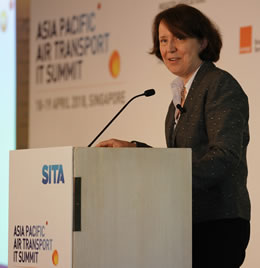ASIA PACIFIC AIR TRANSPORT IT SUMMIT, INDIA – 19 April 2018 – The future of air transport will be driven by a digital transformation in the industry, according to Barbara Dalibard, CEO of global IT provider, SITA. Dalibard was speaking at the Asia Pacific Air Transport IT Summit which gathered C-level airline and airport executives from across the region to discuss the future in this dynamic growth region.
Asia Pacific is leading the tremendous growth in the air travel industry. By 2036, the region is expected to handle over 4.1 billion passengers – more than half of the world’s passenger traffic. With this growth comes challenges and stresses on infrastructure and processes. The industry also faces increased complexity and security regulation globally. Dalibard outlined how technology can provide real value and help the industry navigate the future.
Dalibard said: “Smart use of technology can help manage the challenges of rising passenger numbers, limited infrastructure and increased complexity. At SITA, we are looking at opportunities to harness technologies including biometrics, artificial intelligence, machine learning, robotics and blockchain to transform the industry.

Barbara Dalibard, CEO of global IT provider, SITA.
“Already biometrics is becoming more commonplace at airports around the world and is delivering secure seamless travel from check-in to boarding. Today we work with around 40 governments providing border management solutions. And we have biometric self-service solutions operating worldwide, including in Australia, USA, Mexico and the Middle East.”
SITA is owned by the air transport industry and so has a unique commitment to address community issues. It is investing in new technologies with its industry partners. For example, SITA worked with British Airways, Heathrow, Geneva and Miami airports to explore the opportunity to use blockchain technology for the shared control of data.
Recently, SITA has also invested in research to help airlines and airports tackle the $25 billion annual cost of poor on-time performance. SITA’s technology harnesses advance machine learning and artificial intelligence to forecast aircraft arrival times as far out as 24 hours giving airports the opportunity to proactively manage and mitigate disruption.
Autonomous vehicles and the potential use of robotics is another field of development, with particular interest shown at the event in Kansai Airport’s trial of KATE, SITA’s autonomous check-in robot.
Dalibard added: “By embracing the Internet of Things and connecting everything across the industry we will produce more data which can be used with artificial intelligence to create valuable insights and expose new ways of working. Over the next 20 years, this use of digital technologies to improve service, operations and efficiency will have profound effects on the air transport industry.”
One example of where this is beginning to happen is baggage management. 2018 is the year the International Air Transport Association (IATA) Resolution 753 comes into effect, which will see the industry increase end-to-end baggage tracking. This tracking produces data which reveals where improvements can be made in baggage management processes.
Speaking on the topic, Dalibard commented: “While we won’t see a sudden change in 2018, it is a real turning point for the industry as airlines begin to unlock the value of the tracking data for the 4.65 billion bags they carry. Looking further ahead, combining data collected from bag tracking with data science and machine learning promises even more significant improvements in baggage handling operations. This in turn will reduce costs and improve the passenger experience, a transformation that will be welcomed by everyone.”
You might also like to read: Can Air Travel Be Uberised?
More SITA releases here.
Header Image Credit: Singapore Airlines









